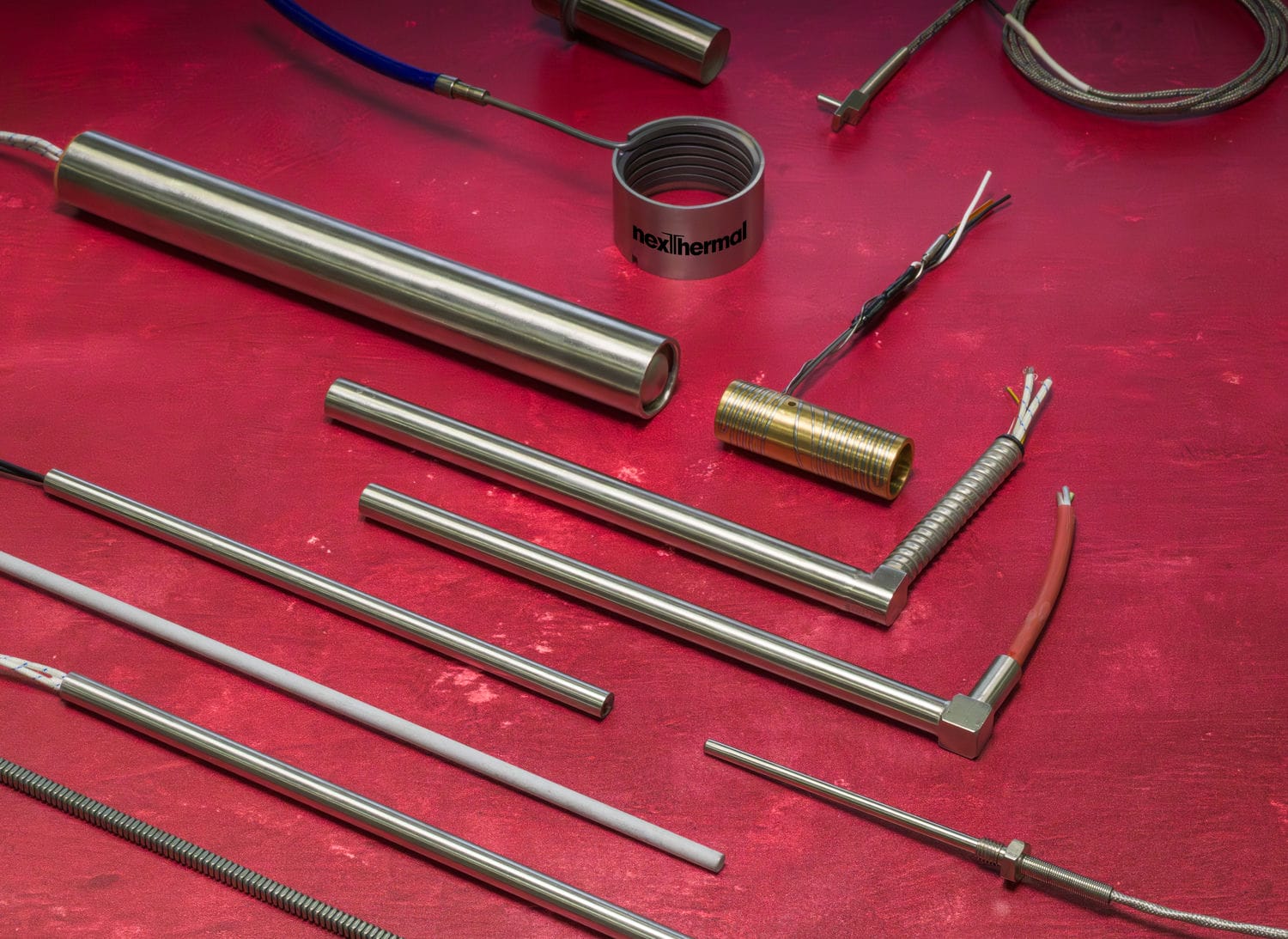The Basics of Coil Heaters
Coil heaters differ from cartridge heaters in that they are formable electric heaters which are used to heat tools from the outside in. The form factor of these heaters is smaller than cartridge heaters and are easier to get into complex shapes needed for three-dimensional heating.
Another common name for this style of heater in the market is a cable heater, although cable heaters are constructed differently internally, they look very similar in appearance. Coil Heaters can typically be utilized to replace a cable heater.
Types of Coil Heaters
Coil heaters are manufactured straight with discreet heated and unheated zones of desired length and watt density. Because these heaters are formable, they can be designed in shapes from the factory such as spiral or star shaped. They can also be customized as per the specific requirements of the buyer or supplied straight to be formed into a machined groove in the tool with a plastic hammer by the customer.
These heaters can be made in several different profile sizes and materials, depending on the fitment to the customers tool and application needs. Some examples are:
- Hot runner nozzle heating in plastics molding
- Platen or insert molding plate in rubber molding
- Micro molding distribution manifold in plastics
- Hotmelt nozzle or pot heaters
- Form, Fill and Seal Packaging jaws in packaging machines
- Food packaging (Top Seal) tray sealing for food production
- Die cast machine nozzle in Zinc die casting machines of all sizes
An integrated thermocouple can be installed in some designs which can be positioned anywhere along the length. This can be an advantage when the part geometry is complex and the temperature measuring point is important, and there is no room for external thermocouple in the design.
Figure 1 – Mini manifold with Ø1/8″ heater
Coil heaters are very flexible in application and can be integrated into supporting structures to protect them from the environment or to enhance the performance further. A good example of this is the Constrictor product that Nexthermal offers. Since coil heaters, during heating to high temperatures, will expand off the heated surface, we manufacture a special alloy clamp that counters the expansion force and keeps the heater in good contact with the surface. This maximizes the performance and helps reflect heat into the tool.
Figure 2 – Stress on standard coil clamp | Figure 3 – Constrictor memory clamp |
Factors to Consider While Selecting a Heater
Temperature
The service temperature of the sheath of the heated zone is influenced by the material used.
- Nexthermal uses stainless steel 321 as a standard for our coil heaters which means the service temperature of the heated zone can operate up to 1472F / 800C continuous (the same as Incoloy 800).
- Smaller format coil heaters can also use Ni201 for the sheath material which is limited to 1250F / 677C but offers a higher degree of flexibility in forming into difficult shapes. These materials allow Nexthermal to solve for a variety of applications with one design.
The temperature in which the coil heater operates will influence the materials used in the construction of the lead connection area.
- As standard the lead wires Nexthermal uses are PTFE based (not PFA or FEP) and are rated to 500F / 260C continuous exposure.
- The transition head that adapts the leads are sealed with high temperature epoxy that is also limited to 500F / 260C and provides moisture resistance. This is especially important in hot runner molding due to high moisture created during the molding process in specific resins.
- A high temperature head and lead wire is also available that expands the temperature to 1202F / 650C.
Corrosion
Coil heaters that Nexthermal manufactures are made from stainless steel 321 as standard, the smaller format heaters can also be made from Nickel 201 for added flexibility.
End caps are TIG welded closed, and special testing can be done to ensure sealed condition.
For some applications the surface of the coil heaters can be passivated to provide for enhanced surface protection, like with medical applications.
Coil heaters used in die casting or other severe environments are best designed into a protective casing that allows the heater protection and extend its service life. Nexthermal has a wide range of materials and coatings that help meet these demanding applications.
Power Supply
The heating element is designed to work with the application power supply. Since it’s a resistive element the voltage can be from low DC voltages (12, 24, 48, 60V) or as high as 480VAC for the style used in die casting processes.
Nexthermal offers coil heaters that are UL recognized for 240V and under if the customers regulations require it.
Wattage
The wattage of the system is driven by the mass being heated, temperature rise desired, the time it takes to reach setpoint, and any heat losses that need to be countered.
Coil heaters, like all electric heaters, have limits on the allowed watt density to be a robust solution in the application. The surface area of the heat transfer as shown in the following graphic illustrates the relationship between type of heat transfer and allowed watt density.
Figure 4 – Watt Density design guide
Applications
Coil heaters are used in many industrial processes where their versatility is well seen in designs that take advantage of their unique formability.
Frequently we see customers trying to improve tool performance by addressing cooler areas, to reduce mass of the tool to reduce cost, to improve thermal responsiveness to changes in the process or just reduce energy use of the tool.
The typical method of using a cartridge heater to heat tools from the inside is limiting in tool design and performance, where coil heaters can be adapted to address all these designs goals.
Nexthermal uses its wide application and product knowledge to help customers get the most of their system. We can work with you to show how coil heaters can be a part of smart heat management.











